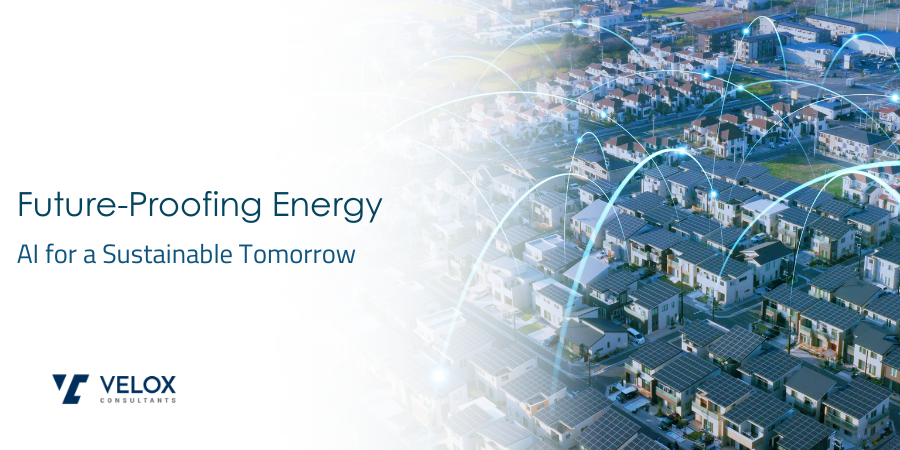An Overview
As the world grapples with the urgent challenge of climate change, the quest for sustainable energy solutions has taken centre stage. Traditional energy systems, heavily reliant on finite fossil fuels, are detrimental to the environment. However, the horizon is not bleak. Innovative technologies are being explored and implemented, and among them, Artificial Intelligence (AI) shines as one of the most promising solutions, offering a beacon of hope for a more sustainable future.
AI is revolutionising various industries by enabling smarter, more efficient operations. AI's capabilities are harnessed in the energy sector to optimise energy use, enhance efficiency, and integrate renewable energy sources seamlessly. By leveraging vast data, AI systems can analyse patterns, make predictions, and automate previously manual and error-prone processes. This intelligence-driven approach is crucial for addressing the complexities and demands of modern energy management.
The application of AI in energy sustainability encompasses a wide range of areas, from improving energy consumption efficiency in buildings to optimising electricity distribution through smart grids. AI algorithms are adept at predicting energy demand, managing supply in real time, and even anticipating equipment failures before they occur. These capabilities not only help in reducing energy wastage but also ensure a reliable and uninterrupted energy supply.

The AI market for the energy sector is expected to grow to more than US$15 billion in 2030, with an estimated CAGR of more than 27% from 2024 to 2030.
The rapid growth of AI in energy sustainability is driven by several key factors that highlight the technology's potential to address pressing challenges and enhance the efficiency and reliability of energy systems.
These driving factors include:
- Rising Energy Costs: As energy costs continue to rise, there is a growing need for more efficient energy use. AI technologies help optimise energy consumption, reducing waste and lowering costs for consumers and businesses.
- Regulatory Pressure: Governments and regulatory bodies implement stricter energy efficiency standards and policies. AI enables compliance with these regulations by providing tools to monitor and manage energy use effectively.
- Variability of Renewable Energy: Renewable energy sources like solar and wind are intermittent and variable. AI helps predict and manage these variations, ensuring a stable and reliable integration of renewables into the energy grid.
- Proliferation of IoT Devices: The widespread deployment of IoT devices, such as smart sensors and meters, provides real-time data on energy consumption. AI uses this data to optimise energy use and identify areas for improvement.
- Sustainable Development Goals: Global initiatives like the United Nations Sustainable Development Goals (SDGs) emphasise the importance of affordable and clean energy. AI plays a crucial role in achieving these goals by enhancing energy sustainability.
- Increased Consumer Awareness: Consumers are becoming more aware of the environmental impact of their energy consumption and are demanding more sustainable energy solutions. AI enables the development of smarter, more sustainable energy products and services.
- Data-Driven Decision-Making: The availability of comprehensive data enables more informed decision-making processes. AI tools provide actionable insights that help stakeholders make better decisions regarding energy use and sustainability strategies.
Impact of AI on Energy Sustainability
The impact of AI on energy sustainability is transformative, touching various facets of the energy sector and driving significant advancements in efficiency, reliability, and integration of renewable energy sources. Here are key areas where AI is making a profound impact:
Enhanced Energy Efficiency
- Operational Optimisation: AI algorithms optimise the operation of energy systems by analysing vast amounts of data in real-time. For instance, AI can adjust buildings' heating, cooling, and lighting systems to reduce energy consumption while maintaining comfort.
- Predictive Maintenance: AI systems predict equipment failures before they occur, allowing for timely maintenance and reducing downtime. This predictive capability not only ensures continuous operation but also enhances the efficiency of energy-consuming equipment.
Consumer Energy Management
- Smart Meters: AI-powered smart meters provide consumers with real-time data on their energy usage. This transparency helps consumers make informed decisions about their energy consumption and adopt energy-saving practices.
- Personalised Recommendations: AI analyses consumption patterns and provides recommendations to consumers on reducing their energy use, contributing to overall energy efficiency.
Environmental Benefits
- Reduction in Carbon Emissions: AI significantly reduces carbon emissions by optimising energy use and integrating renewable sources more effectively. This helps in combating climate change and promoting environmental sustainability.
- Resource Conservation: AI-driven efficiency improvements lead to reduced resource consumption, such as lower use of fossil fuels and water, further supporting sustainability goals.
Economic Benefits
- Cost Savings: Improved energy efficiency and optimised energy management result in cost savings for consumers and energy providers. These savings can be reinvested in further sustainability initiatives.
- Increased Competitiveness: Companies embracing AI for energy sustainability contribute to environmental protection and gain a competitive edge. By reducing operational costs and enhancing their sustainability credentials, these companies attract environmentally conscious consumers and investors, increasing competitiveness and potential economic benefits.
The impact of AI on energy sustainability is far-reaching, offering numerous benefits across efficiency, reliability, economic savings, and environmental protection. As AI technologies evolve, their role in creating a sustainable and resilient energy future will only become more significant, driving progress towards global sustainability goals.
Industry Expert Perspectives on the Adoption of AI for Energy Sustainability
The adoption of AI in energy sustainability has garnered significant attention from industry experts, who provide valuable insights into its potential, challenges, and future direction. Here is the summary of various perspectives from industry experts across the world:
Dr Fatih Birol, Executive Director, International Energy Agency (IEA) –
AI has the potential to revolutionise the energy sector by optimising the use of resources, integrating renewable energy sources more effectively, and enhancing grid reliability. The key is to ensure that AI is used responsibly and inclusively to maximise its benefits for energy sustainability.
(Sources: IEA's official reports, Keynote speeches at global energy forums such as the IEA Ministerial Meeting)
Reji Kumar Pillai, President, India Smart Grid Forum (ISGF) –
Adopting AI in India's energy sector is crucial for developing smart grids that can efficiently manage energy distribution and consumption. AI technologies enable real-time monitoring and predictive maintenance, essential for creating a resilient and sustainable energy infrastructure.
(Sources: ISGF's annual events such as the India Smart Utility Week (ISUW), Articles for Smart Energy International)
Dr Rahul Walawalkar, President, India Energy Storage Alliance (IESA) –
AI is a game-changer for energy storage and management in India. By optimising the use of battery storage systems and enhancing the integration of renewable energy, AI helps address the challenges of energy variability and ensure a stable energy supply.
(Sources: IESA's publications, Energy Storage India (ESI) conference, Interviews with energy and technology media outlets like Renewable Watch and PV Magazine India)
Key Areas of AI Application in Energy Sustainability
AI-driven smart grids and demand response systems predict energy demand and automate responses, ensuring efficient energy use and reducing waste. In renewable energy, AI forecasts weather patterns to optimise solar and wind energy generation and manages energy storage systems to balance supply and demand. AI also empowers consumers through smart meters and personalised energy-saving recommendations, driving efficiency and sustainability across the energy landscape. Here are a few key applications for AI in energy sustainability:
 Energy Management Systems
Energy Management Systems
- Smart Grids: AI algorithms optimise the distribution and consumption of electricity. They can predict energy demand, detect anomalies, and automate responses to ensure efficient energy use.
- Demand Response: AI helps forecast energy demand patterns and automate responses to balance demand and supply, reducing peak loads and preventing energy waste.
Renewable Energy Integration
- Solar and Wind Energy: AI predicts weather patterns and solar/wind power generation, optimising the integration of renewable sources into the grid. It ensures a stable and reliable supply of renewable energy.
- Energy Storage: AI optimises the operation of battery storage systems, managing energy storage and release to align with demand and supply fluctuations.
Energy Efficiency in Buildings
- Smart Building Management: AI systems control heating, ventilation, air conditioning (HVAC) systems, lighting, and other energy-consuming devices to minimise energy use while maintaining comfort.
- Predictive Maintenance: AI monitors and predicts equipment failures, ensuring timely maintenance and reducing energy wastage.
Grid Optimisation and Stability
- Load Forecasting: AI accurately predicts energy load patterns, helping utilities manage energy distribution more effectively.
- Fault Detection and Prevention: AI identifies and predicts faults in the energy grid, preventing outages and enhancing grid reliability.
Energy Consumption Monitoring
- Smart Meters: AI-powered smart meters provide real-time data on energy consumption, helping consumers and utilities track and manage energy use.
- Behavioural Insights: AI analyses consumption data to provide insights into usage patterns and suggests ways to reduce energy consumption.
Renewable Energy Forecasting
- Weather Prediction Models: AI improves the accuracy of weather forecasts, which is crucial for predicting the output of solar and wind energy systems.
- Energy Yield Predictions: AI models predict the potential energy yield from renewable sources, aiding in planning and optimising their use.
Decentralised Energy Systems
- Microgrids: AI manages microgrids, which are localised grids that can operate independently or in conjunction with the main grid, enhancing energy resilience and sustainability.
- Peer-to-Peer Energy Trading: AI facilitates peer-to-peer energy trading in decentralised energy systems, allowing consumers to buy and sell excess energy efficiently.
Leading Companies and Start-ups Applying AI for Energy Sustainability
Globally, a few companies and start-ups demonstrate AI's diverse applications in enhancing energy sustainability, optimising energy systems, and integrating renewable energy sources. Their innovative approaches and technologies contribute significantly to creating a more sustainable and efficient energy future.
- Google: Google's DeepMind has applied AI to optimise the cooling systems in its data centres, achieving a 40% reduction in energy used for cooling and a 15% reduction in overall energy consumption.
- Siemens: Siemens uses AI in its smart grid solutions to optimise energy distribution and integrate renewable energy sources. Their AI-driven systems enhance grid reliability and efficiency.
- Tesla: Tesla integrates AI in its Powerwall and Powerpack energy storage systems to optimise energy storage and distribution, enhancing the efficiency and reliability of renewable energy systems.
- Stem, Inc. uses AI to optimise energy storage systems, providing real-time energy management solutions that help integrate renewable energy sources and reduce energy costs.
- Autogrid: Autogrid's AI-driven platform provides advanced energy analytics and optimisation solutions, enabling utilities and energy providers to manage demand response and integrate renewable energy sources effectively.
- Grid4C: Based in Israel, Grid4C uses AI to predict and optimise energy use in homes and businesses, providing real-time insights and recommendations to enhance energy efficiency and reduce costs.
- Tata Power: Tata Power leverages AI to optimise energy distribution and enhance the efficiency of its smart grid solutions. Their AI-driven systems improve grid reliability and integrate renewable energy sources.
- ReNew Power: ReNew Power utilises AI for predictive maintenance and performance optimisation of its wind and solar energy projects. AI-driven solutions enhance the efficiency and reliability of renewable energy generation.
- Smart Joules: Smart Joules uses AI to provide energy efficiency solutions for commercial buildings and industrial sites. Their AI-driven platform, DeJoule, optimises energy use and reduces energy costs.
- Zenatix: Zenatix uses AI to offer energy management solutions for buildings and enterprises. Their AI-driven platform monitors and optimises energy use, enhancing energy efficiency and reducing costs.
Our Perspective
AI is emerging as a transformative force in the energy sector, offering innovative solutions to enhance sustainability, efficiency, and reliability. At Velox Consultants, AI is key to addressing some of the most pressing challenges in energy management, from optimising resource use to integrating renewable energy sources seamlessly. Our perspective on AI for energy sustainability encompasses its potential benefits, strategic implementation, and role in driving business growth.
AI's capabilities in analysing vast datasets, making precise predictions, and automating complex processes make it an invaluable tool for the energy sector. A few critical areas AI significantly impacts are energy efficiency, renewable energy integration, smart grids, and consumer energy management.
We recommend the following for achieving the desired business growth in AI for energy sustainability:
Collaborate with Technology Partners:
- Partner with technology providers specialising in AI and energy solutions to leverage their expertise and accelerate innovation.
- Engage in collaborative projects and pilot programs to test and refine AI applications in real-world settings.
Stay Informed on Regulatory Changes:
- Keep abreast of regulatory developments and incentives related to energy efficiency and renewable energy.
- Ensure compliance with regulations while taking advantage of government incentives to support AI adoption.
Invest in Skill Development:
- Build a team with AI, data analytics, and energy management expertise.
- Provide ongoing training and development opportunities to update your team on the latest AI technologies and applications.
Promote Sustainability Initiatives:
- Highlight your commitment to sustainability in marketing and communications to attract environmentally conscious customers and investors.
- Demonstrate the tangible benefits of your AI-driven energy solutions in reducing carbon footprints and enhancing sustainability.
Expand Market Reach:
- Explore new markets and regions where AI for energy sustainability is gaining traction.
- Adapt your solutions to meet different markets' specific needs and regulatory requirements.
Measure and Communicate impact:
- Establish metrics to measure the impact of your AI applications on energy efficiency and sustainability.
- To build trust and credibility, communicate these impacts clearly to stakeholders, including customers, investors, and regulatory bodies.
At Velox Consultants, we are committed to driving the adoption of AI for energy sustainability. By leveraging AI's capabilities, we believe businesses can significantly improve energy efficiency, reliability, and integration of renewable sources. Our recommendations aim to guide businesses in successfully adopting AI technologies and realising their full potential for sustainable growth. By investing in AI, businesses can enhance operational efficiency and contribute to a more sustainable and resilient energy future.
In the fast-paced business world, staying ahead of the competition requires timely and accurate insights. Velox Consultants has recently launched VeloData Insights, a real-time market research service that delivers just that — providing actionable intelligence as events unfold. Whether it's monitoring industry trends, analysing competitor activities, or understanding consumer preferences, our comprehensive market monitoring and consumer insight services ensure you have the data you need right when needed. This immediate access to up-to-the-minute data empowers your strategic moves and gives you a competitive edge in a constantly evolving market landscape.
Contact us at consult@veloxconsultants.com to learn more about our real-time market research services.

Energy Management Systems




